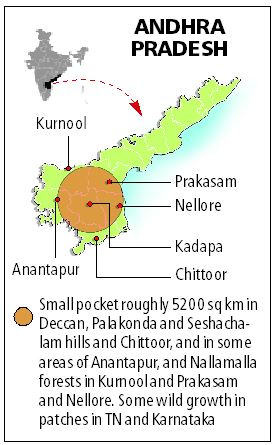 |
| Red Sanders - Source: Deccan Chronicle |
Why in news?
The Madras High Court today granted bail to a Deputy Superintendent of Police (DSP) allegedly involved in red sanders smuggling case. Red Sanders wood is so rare, coveted, and at the centre of bloody scrubland gunbattles in the east central Deccan.
What is Red Sanders?
- Red Sanders, botanical name Pterocarpus santalinus, is a non-fragrant variety of sandalwood that mostly grows in rocky, hilly regions.
- Saplings reach 8 to 10 m in 3-4 years, but growth slows down after that.
- The trunks are slender, and it takes at least 20-25 years for the tree’s beautiful, deep red wood to be of use.
- Andhra Pradesh forest department officials say this particular type of Red Sanders grows nowhere else in the world.
 |
| Source: Hindustan Times |
Where exactly does it grow?
- In the thorny scrub/dry deciduous forests of the central Deccan, between 500 ft and 3000 ft.
- Geographically, only in a small pocket roughly 5,200 sq km in the Palakonda and Seshachalam hills in the districts of Kadapa and Chittoor, in some contiguous areas of Anantapur district, in the Nallamalla forests in Kurnool and Prakasam, and in parts of Nellore district. Some contiguous patches in Tamil Nadu and Karnataka see some wild growth.

Why is it coveted?
There is big demand overseas, especially in China and Japan, where Red Sanders furniture, chess sets and musical instruments are status symbols. - There is very little supply.
- Red Sanders is a fast disappearing species restricted to a tiny geographical area.
So,
- Felling is illegal, export is highly restricted.
- Permission is required to fell and sell even trees in private farms.
- In the black market, a tonne of Red Sanders fetches between Rs 15 lakh and Rs 30 lakh depending on its quality (Grade A, B, or C).
How is the trade controlled?
- Red Sanders is a protected species under the Convention on International Trade in Endangered Species (CITES) of Wild Fauna and Flora
- Until 2014, auction or trade of even seized logs was banned
- The ban was lifted because over 10,000 tonnes of logs had accumulated in Andhra Pradesh government godowns.
- Only e-auction is allowed.
- Last December, the state government raised Rs 991 crore in e-auctions — an average Rs. 27 lakh per tonne.
How rampant is smuggling?
- Over 500 tonnes are is smuggled out every year.
- China, Japan, Singapore, Malaysia and UAE are believed to be the destinations or transit points, with the consignments leaving India through ports in Chennai and Mumbai, and by road across the Nepal border and through the Northeast.
How frequent are police-smuggler clashes?
- Almost daily skirmishes especially in the Seshachalam forests into which smugglers enter from Tamil Nadu and Karnataka.
- On December 15, 2013, two forest officers were stoned and axed to death by a gang
- DIG Task Force (Anti-Red Sanders Smuggling) says forest officers are often helpless against the gangs who launch vicious attacks with stones and sharp instruments at anyone who challenges them.
How do the smugglers operate? (for general reading - NOT imp for exams)
Red Sanders has been seized in Mumbai, Nepal, Chhattisgarh, J&K, Kolkata and Orissa. Officials say the main smuggling gangs are from Tamil Nadu. They camp in hotels and lodges in Proddatur and Mydkur towns in Kadapa district, and rope in villagers on the periphery of the forest to do the felling, often paying them Rs 1,500 to Rs 2,000 for a day’s work. The agents get up to Rs 1 lakh per operation. They use cell phones and GPS to keep track of forest vehicles, and of their own men and trucks. The agents carry firearms and large amounts of cash to bribe forest guards. The usual modus operandi is to send a decoy on a motorcycle who — in case he is stopped by a vigilance squad or forest guards — alerts the truck driver by cell phone. A ‘pilot’ vehicle, usually carrying an agent, then arrives to check if the officials can be bribed. If that is not possible, firing usually follows. Many ring leaders camping in Kadapa have been arrested under the Andhra Pradesh Prevention of Dangerous Activities of Bootleggers, Dacoits, Drug Offenders, Goondas, Immoral Traffic Offenders and Land Grabbers Act (PD Act).
[Sources: Indian Express, Hindustan Times, The Hindu, Wikipedia]

0 comments:
Post a Comment